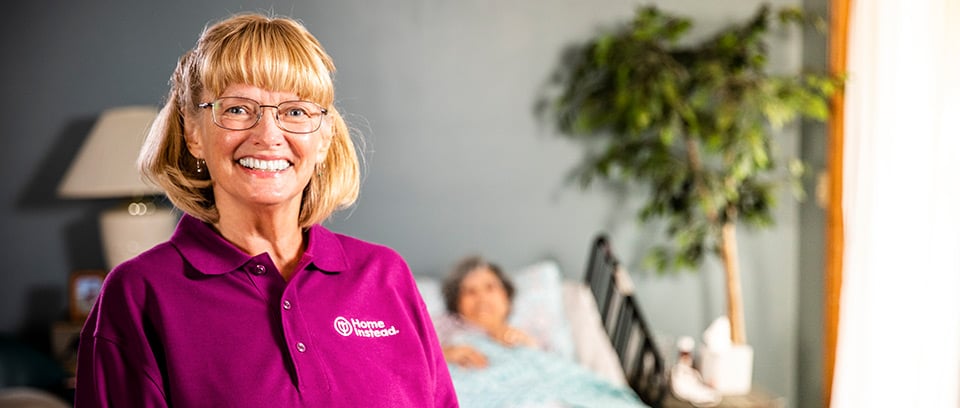Vancouver & Burnaby (Change Location)
Living at Home With Parkinson's Disease
Parkinson’s disease (PD) is a neurodegenerative brain disorder that progresses slowly and affects a senior’s ability to regulate movement and emotional functions. Apart from not having a cure (yet), the troubling aspects with this disease are the lack of linearity in its progression, the unpredictability and sequencing of its symptoms and rate of its progression within those affected.

There are however, operative medications, treatments, and modifications to lifestyle that can be made to effectively deal with the symptoms and combat the ill effects of this disease. Through a combination of approaches including expert home care, a senior with Parkinson’s can maintain their quality of life, continuing to live at home for many years, even decades.
General indicators of the disease can span the full range of non-motor and motor symptoms, and while the impact varies within those affected, the common symptoms are:
- SLOWNESS: Known as bradykinesia, this makes starting and performing physical actions such as getting out of bed, buttoning a shirt, or speaking more difficult.
- INVOLUNTARY TREMORS: A tremor usually occurs in the hand on the affected side but also can appear in other parts of the body.
- MUSCULAR STIFFNESS: Muscles in the arms, legs, or torso feel unusually tight, stiff, or achy.
- BALANCE AND FALL RISK: This postural instability causes difficulty with balance, walking, and turning around. Frequent falls may occur without explanation.
- SOFT LOW VOICE: Called hypophonia, this affects volume and can cause muffled speech.
- TROUBLE SWALLOWING: Decreased ability in auto reflexes such as swallowing and blinking.
Very often the devastating impact of Parkinson’s is felt not only by those seniors affected by it but also their family members. While a Parkinson’s diagnosis can be traumatic, with a robust management plan, an affected senior and their family can react more impactfully to the symptoms and greatly reduce the debilitating effects of this disease.
A robust reaction plan will have many elements including engaging expert medical advice, educating oneself, forming a support group of friends and family, reaching out to others with PD, focusing on emotional wellbeing and initiating lifestyle changes (diet, exercise).
By the intermediary stages of Parkinson’s, most affected seniors will experience loss of balance and trouble with their movements. This is typically the stage where families have found that adding a care professional for support can be extremely beneficial.
Our team at Home Instead Senior Care (Burnaby and South Vancouver) have had the opportunity to support many of our clients and their families on the arduous life path they have been put on because of PD. The learnings gathered from these experiences has helped us tremendously in serving other clients within our community afflicted with the same illness.
Highly compassionate, trained and experienced caregivers can make a significant difference to a senior’s robust response and to maintaining their quality of life in many ways:
- Assist senior with personal care and dressing as slowness sets in and gets progressively severe as PD progresses. The compassionate and dignified approach of a caregiver also brings comforts to many seniors who at times feel stressed about having family members assist in these intimate daily activities
- Support in eating and diet, with focus on the senior loved one getting regular healthy meals and not being restricted because of physical constraints (tremors etc.)
- Ensuring safety of the senior during ambulation and transfers, while helping them avoid psychological hesitation that manifests due to frequent falls in the past
- Assisting the senior with basic range of motion (ROM) exercise to maintain muscle suppleness and efficiency
- Emotional support and engagement; one on one focus on the senior, ensures their mental state remains optimistic and uplifted in the face of mood changes induced by PD
- Respite to family members allowing them to take time for their own well-being, to connect with friends, to relieve stress in healthy ways; while knowing their loved one is being cared for by a compassionate, trained professional
- Enabling the senior to continue living and thriving in the comfort of their own home (rather than being institutionalized) by effectively becoming their coach in creating the various lifestyle adjustments to daily living necessitated by the onset of PD.
At Home Instead Senior Care (Burnaby and South Vancouver), it is our privilege to support our clients and their families in the difficult ordeal that frequents a seniors’ life with Parkinson’s. It is our constant endeavor to offer the highest quality, client-centered care to our clients dealing with Parkinson’s within the Burnaby and South Vancouver communities, and thereby doing our part in defeating the difficult effects of this terrible affliction as much as possible.
